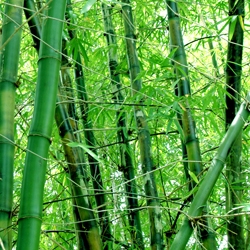Bamboo Fabric: Everything You Wanted To Know
Sharon Santino,
Dec 16, 2010
 Bamboo yarn is an environmentally friendly textile made from bamboo grass, which is used to make eco-friendly apparel. Despite only entering the market in the early 2000s, demand for this economical and ecological material is high because it is soft yet durable, absorbs wetness, regulates body temperature and has antibacterial properties.
Bamboo yarn is an environmentally friendly textile made from bamboo grass, which is used to make eco-friendly apparel. Despite only entering the market in the early 2000s, demand for this economical and ecological material is high because it is soft yet durable, absorbs wetness, regulates body temperature and has antibacterial properties.
To create this material, the bamboo is pulped until it separates into fiber. These fibers are then either refined with bleach, to make them white, or left unbleached which makes them blonde-colored and organic. In its unspun form, bamboo resembles cotton - a soft ball of delicate, wispy fibers. The end result is then spun and dyed, creating a soft and strong textile.
Some of the benefits of using bamboo in textiles include:
Sustainable: The bamboo plant grows quickly (up to a meter a day), densely and regenerates without replanting - making it more convenient and cost effective than fabrics made from materials such as cotton or wool.
Environmentally friendly: Bamboo does not require the use of pesticides or herbicides to flourish so it can be an organic fabric. It is also biodegradable.
Comfortable: As a fabric, it is soft, comparable to silk - without being fragile and can be crafted into luxury items such as robes.
Absorbent: Bamboo is able to take up three times its weight in water, giving it the ability to wick moisture away from the skin so that it can evaporate, making it a great material for beach towels.
Thermo-regulating: It is often used to make sportswear such as baseball caps or polos because it regulates body temperature. As the temperature rises, bamboo fibers expand to let skin breathe and contract when the body cools to trap warmth.
Hypo-allergenic: Bamboo doesn't need pesticides to thrive thanks to an anti-bacterial bio-agent called bamboo kun. Bamboo kun is bound closely in the bamboo cells, making it resistant to bacteria. This quality is retained through the manufacturing process, making it an ideal fabric for those who have allergies.
Due to the versatility of bamboo textiles, the fabric is projected to grow in popularity. Expect to see more of this environmentally friendly grass in the years to come!


